Effective Time Management Strategies for Academic Performance
VerifiedAdded on 2023/06/10
|6
|1306
|342
Report
AI Summary
This individual case study report delves into the critical role of time management in academic success. It defines time management as the strategic planning and control of time to enhance efficiency, affecting both the quality of life and professional or academic outcomes. The report emphasizes the importance of time management in student life, highlighting how it enables students to complete tasks, meet deadlines, and avoid academic setbacks. It discusses strategies such as planning ahead, prioritizing tasks, avoiding distractions, and avoiding multitasking. The study also underscores the link between time management and stress reduction, emphasizing that effective time management enhances productivity, organization, and the ability to deliver work on time. The report concludes that understanding and implementing time management skills is crucial for students to achieve their academic and professional goals, and to identify and capitalize on opportunities.
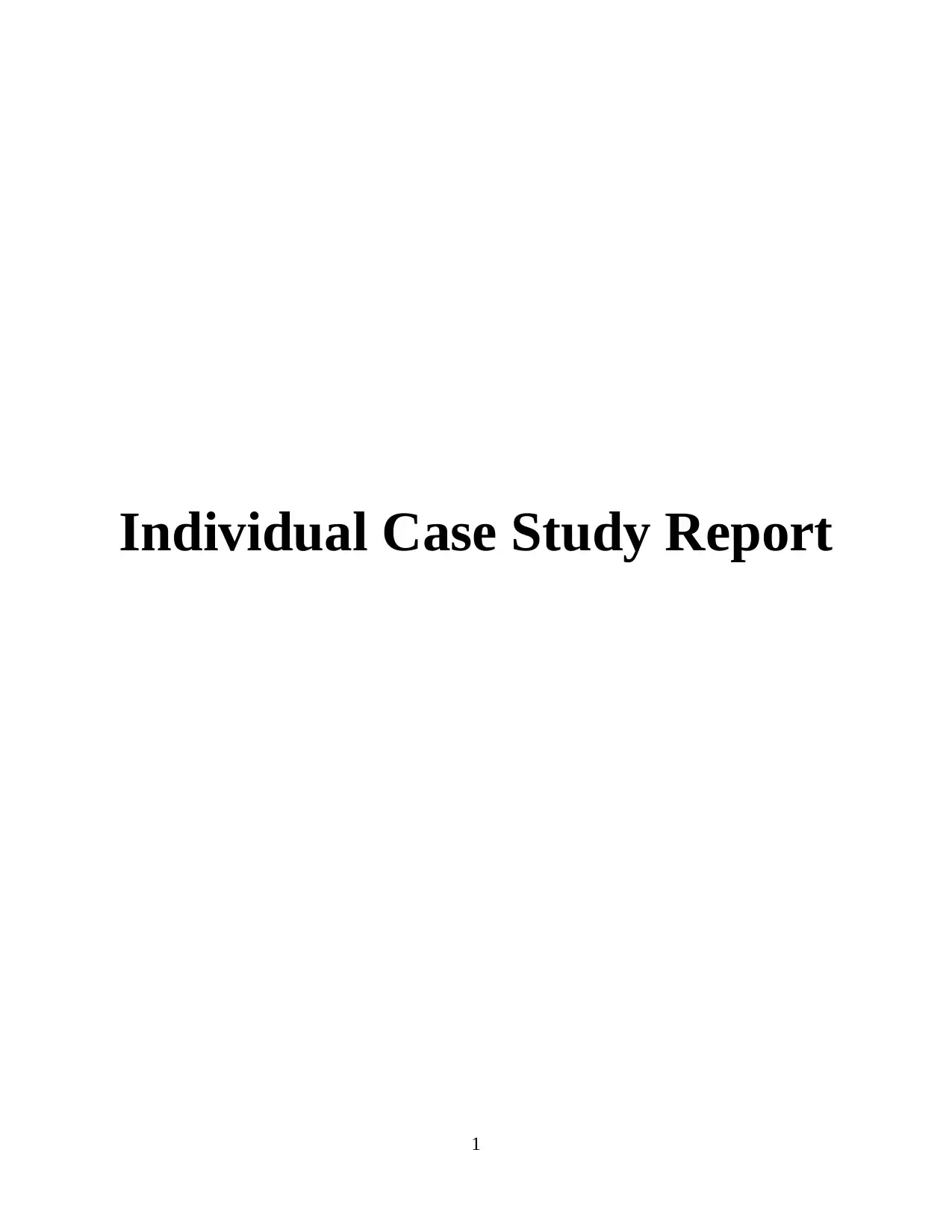
Individual Case Study Report
1
1
Paraphrase This Document
Need a fresh take? Get an instant paraphrase of this document with our AI Paraphraser
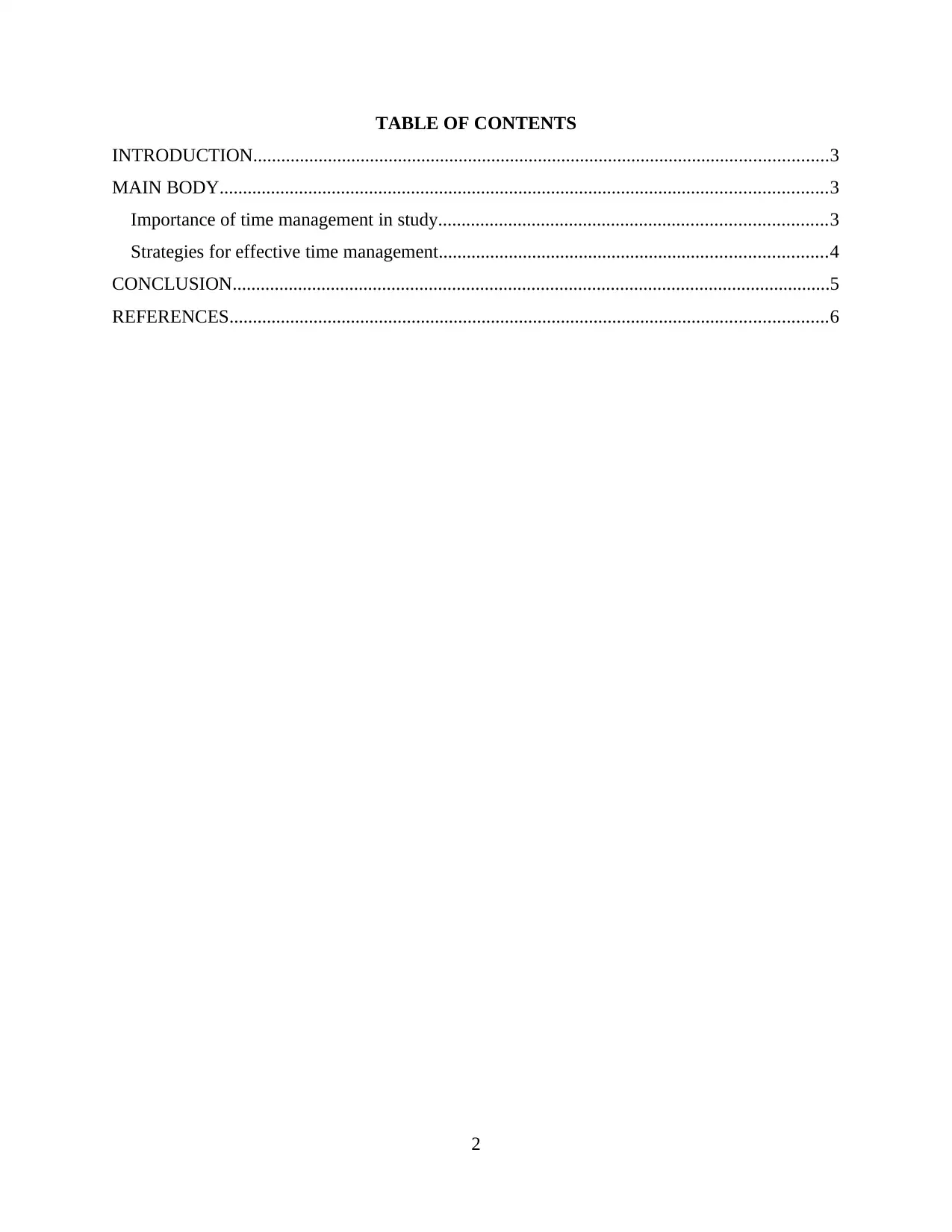
TABLE OF CONTENTS
INTRODUCTION...........................................................................................................................3
MAIN BODY..................................................................................................................................3
Importance of time management in study...................................................................................3
Strategies for effective time management...................................................................................4
CONCLUSION................................................................................................................................5
REFERENCES................................................................................................................................6
2
INTRODUCTION...........................................................................................................................3
MAIN BODY..................................................................................................................................3
Importance of time management in study...................................................................................3
Strategies for effective time management...................................................................................4
CONCLUSION................................................................................................................................5
REFERENCES................................................................................................................................6
2
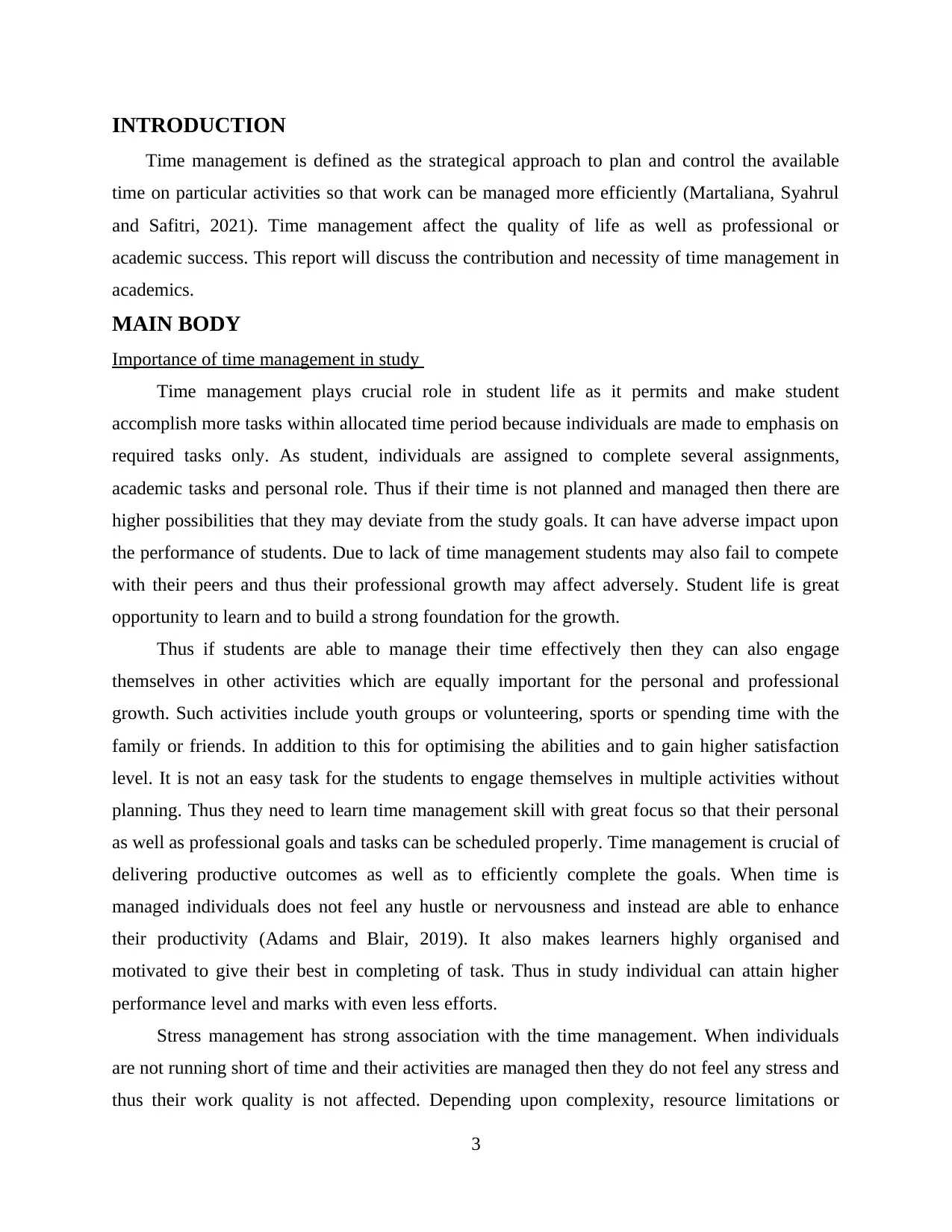
INTRODUCTION
Time management is defined as the strategical approach to plan and control the available
time on particular activities so that work can be managed more efficiently (Martaliana, Syahrul
and Safitri, 2021). Time management affect the quality of life as well as professional or
academic success. This report will discuss the contribution and necessity of time management in
academics.
MAIN BODY
Importance of time management in study
Time management plays crucial role in student life as it permits and make student
accomplish more tasks within allocated time period because individuals are made to emphasis on
required tasks only. As student, individuals are assigned to complete several assignments,
academic tasks and personal role. Thus if their time is not planned and managed then there are
higher possibilities that they may deviate from the study goals. It can have adverse impact upon
the performance of students. Due to lack of time management students may also fail to compete
with their peers and thus their professional growth may affect adversely. Student life is great
opportunity to learn and to build a strong foundation for the growth.
Thus if students are able to manage their time effectively then they can also engage
themselves in other activities which are equally important for the personal and professional
growth. Such activities include youth groups or volunteering, sports or spending time with the
family or friends. In addition to this for optimising the abilities and to gain higher satisfaction
level. It is not an easy task for the students to engage themselves in multiple activities without
planning. Thus they need to learn time management skill with great focus so that their personal
as well as professional goals and tasks can be scheduled properly. Time management is crucial of
delivering productive outcomes as well as to efficiently complete the goals. When time is
managed individuals does not feel any hustle or nervousness and instead are able to enhance
their productivity (Adams and Blair, 2019). It also makes learners highly organised and
motivated to give their best in completing of task. Thus in study individual can attain higher
performance level and marks with even less efforts.
Stress management has strong association with the time management. When individuals
are not running short of time and their activities are managed then they do not feel any stress and
thus their work quality is not affected. Depending upon complexity, resource limitations or
3
Time management is defined as the strategical approach to plan and control the available
time on particular activities so that work can be managed more efficiently (Martaliana, Syahrul
and Safitri, 2021). Time management affect the quality of life as well as professional or
academic success. This report will discuss the contribution and necessity of time management in
academics.
MAIN BODY
Importance of time management in study
Time management plays crucial role in student life as it permits and make student
accomplish more tasks within allocated time period because individuals are made to emphasis on
required tasks only. As student, individuals are assigned to complete several assignments,
academic tasks and personal role. Thus if their time is not planned and managed then there are
higher possibilities that they may deviate from the study goals. It can have adverse impact upon
the performance of students. Due to lack of time management students may also fail to compete
with their peers and thus their professional growth may affect adversely. Student life is great
opportunity to learn and to build a strong foundation for the growth.
Thus if students are able to manage their time effectively then they can also engage
themselves in other activities which are equally important for the personal and professional
growth. Such activities include youth groups or volunteering, sports or spending time with the
family or friends. In addition to this for optimising the abilities and to gain higher satisfaction
level. It is not an easy task for the students to engage themselves in multiple activities without
planning. Thus they need to learn time management skill with great focus so that their personal
as well as professional goals and tasks can be scheduled properly. Time management is crucial of
delivering productive outcomes as well as to efficiently complete the goals. When time is
managed individuals does not feel any hustle or nervousness and instead are able to enhance
their productivity (Adams and Blair, 2019). It also makes learners highly organised and
motivated to give their best in completing of task. Thus in study individual can attain higher
performance level and marks with even less efforts.
Stress management has strong association with the time management. When individuals
are not running short of time and their activities are managed then they do not feel any stress and
thus their work quality is not affected. Depending upon complexity, resource limitations or
3
⊘ This is a preview!⊘
Do you want full access?
Subscribe today to unlock all pages.

Trusted by 1+ million students worldwide
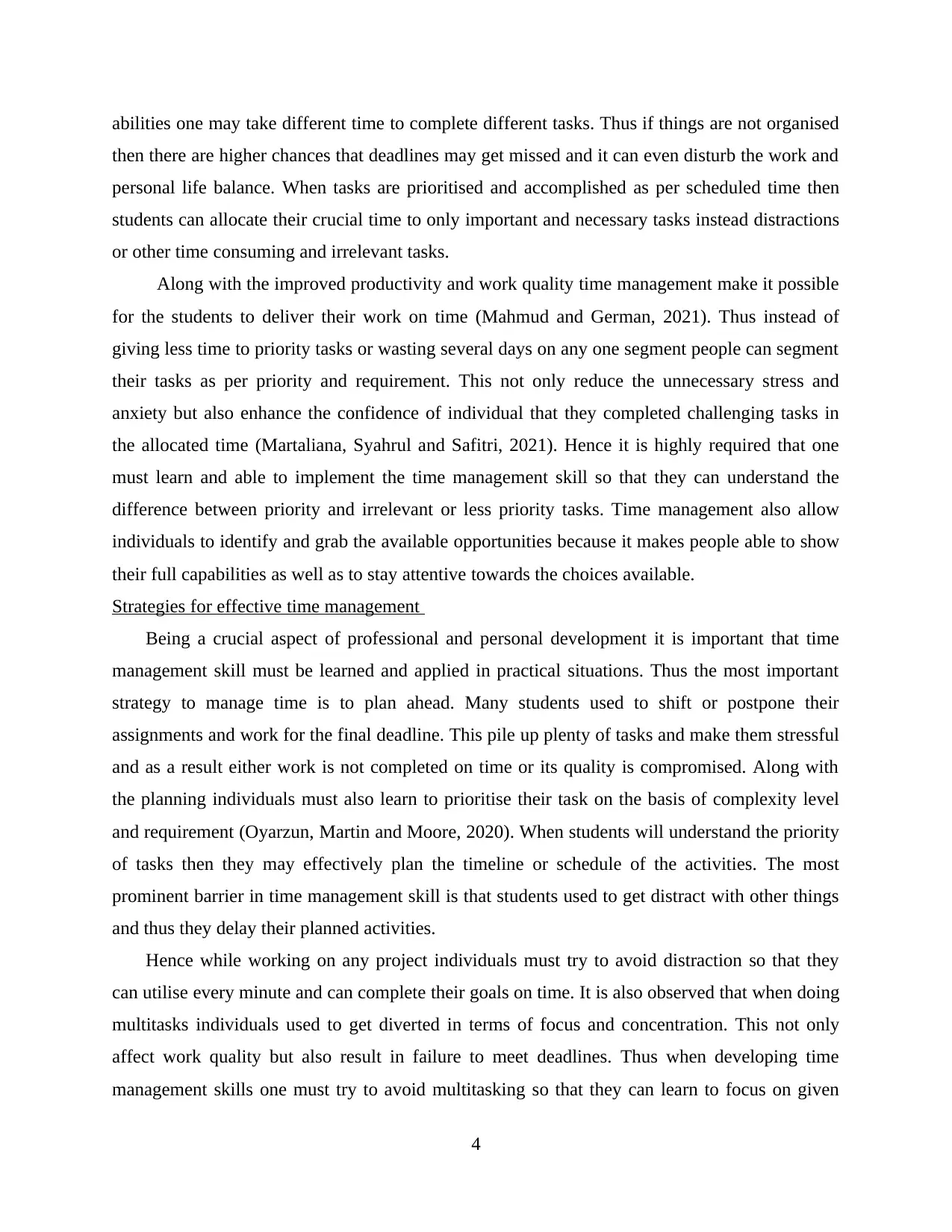
abilities one may take different time to complete different tasks. Thus if things are not organised
then there are higher chances that deadlines may get missed and it can even disturb the work and
personal life balance. When tasks are prioritised and accomplished as per scheduled time then
students can allocate their crucial time to only important and necessary tasks instead distractions
or other time consuming and irrelevant tasks.
Along with the improved productivity and work quality time management make it possible
for the students to deliver their work on time (Mahmud and German, 2021). Thus instead of
giving less time to priority tasks or wasting several days on any one segment people can segment
their tasks as per priority and requirement. This not only reduce the unnecessary stress and
anxiety but also enhance the confidence of individual that they completed challenging tasks in
the allocated time (Martaliana, Syahrul and Safitri, 2021). Hence it is highly required that one
must learn and able to implement the time management skill so that they can understand the
difference between priority and irrelevant or less priority tasks. Time management also allow
individuals to identify and grab the available opportunities because it makes people able to show
their full capabilities as well as to stay attentive towards the choices available.
Strategies for effective time management
Being a crucial aspect of professional and personal development it is important that time
management skill must be learned and applied in practical situations. Thus the most important
strategy to manage time is to plan ahead. Many students used to shift or postpone their
assignments and work for the final deadline. This pile up plenty of tasks and make them stressful
and as a result either work is not completed on time or its quality is compromised. Along with
the planning individuals must also learn to prioritise their task on the basis of complexity level
and requirement (Oyarzun, Martin and Moore, 2020). When students will understand the priority
of tasks then they may effectively plan the timeline or schedule of the activities. The most
prominent barrier in time management skill is that students used to get distract with other things
and thus they delay their planned activities.
Hence while working on any project individuals must try to avoid distraction so that they
can utilise every minute and can complete their goals on time. It is also observed that when doing
multitasks individuals used to get diverted in terms of focus and concentration. This not only
affect work quality but also result in failure to meet deadlines. Thus when developing time
management skills one must try to avoid multitasking so that they can learn to focus on given
4
then there are higher chances that deadlines may get missed and it can even disturb the work and
personal life balance. When tasks are prioritised and accomplished as per scheduled time then
students can allocate their crucial time to only important and necessary tasks instead distractions
or other time consuming and irrelevant tasks.
Along with the improved productivity and work quality time management make it possible
for the students to deliver their work on time (Mahmud and German, 2021). Thus instead of
giving less time to priority tasks or wasting several days on any one segment people can segment
their tasks as per priority and requirement. This not only reduce the unnecessary stress and
anxiety but also enhance the confidence of individual that they completed challenging tasks in
the allocated time (Martaliana, Syahrul and Safitri, 2021). Hence it is highly required that one
must learn and able to implement the time management skill so that they can understand the
difference between priority and irrelevant or less priority tasks. Time management also allow
individuals to identify and grab the available opportunities because it makes people able to show
their full capabilities as well as to stay attentive towards the choices available.
Strategies for effective time management
Being a crucial aspect of professional and personal development it is important that time
management skill must be learned and applied in practical situations. Thus the most important
strategy to manage time is to plan ahead. Many students used to shift or postpone their
assignments and work for the final deadline. This pile up plenty of tasks and make them stressful
and as a result either work is not completed on time or its quality is compromised. Along with
the planning individuals must also learn to prioritise their task on the basis of complexity level
and requirement (Oyarzun, Martin and Moore, 2020). When students will understand the priority
of tasks then they may effectively plan the timeline or schedule of the activities. The most
prominent barrier in time management skill is that students used to get distract with other things
and thus they delay their planned activities.
Hence while working on any project individuals must try to avoid distraction so that they
can utilise every minute and can complete their goals on time. It is also observed that when doing
multitasks individuals used to get diverted in terms of focus and concentration. This not only
affect work quality but also result in failure to meet deadlines. Thus when developing time
management skills one must try to avoid multitasking so that they can learn to focus on given
4
Paraphrase This Document
Need a fresh take? Get an instant paraphrase of this document with our AI Paraphraser
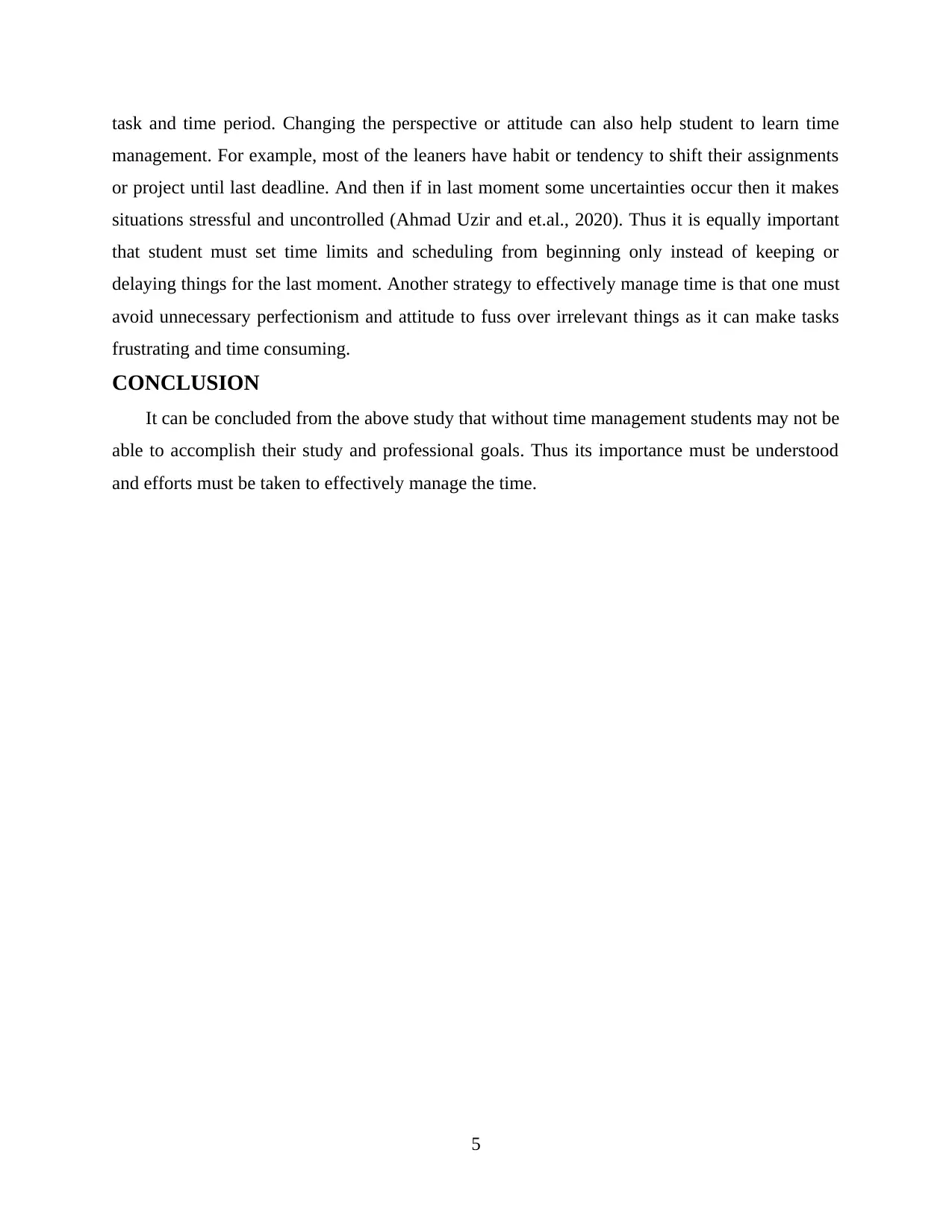
task and time period. Changing the perspective or attitude can also help student to learn time
management. For example, most of the leaners have habit or tendency to shift their assignments
or project until last deadline. And then if in last moment some uncertainties occur then it makes
situations stressful and uncontrolled (Ahmad Uzir and et.al., 2020). Thus it is equally important
that student must set time limits and scheduling from beginning only instead of keeping or
delaying things for the last moment. Another strategy to effectively manage time is that one must
avoid unnecessary perfectionism and attitude to fuss over irrelevant things as it can make tasks
frustrating and time consuming.
CONCLUSION
It can be concluded from the above study that without time management students may not be
able to accomplish their study and professional goals. Thus its importance must be understood
and efforts must be taken to effectively manage the time.
5
management. For example, most of the leaners have habit or tendency to shift their assignments
or project until last deadline. And then if in last moment some uncertainties occur then it makes
situations stressful and uncontrolled (Ahmad Uzir and et.al., 2020). Thus it is equally important
that student must set time limits and scheduling from beginning only instead of keeping or
delaying things for the last moment. Another strategy to effectively manage time is that one must
avoid unnecessary perfectionism and attitude to fuss over irrelevant things as it can make tasks
frustrating and time consuming.
CONCLUSION
It can be concluded from the above study that without time management students may not be
able to accomplish their study and professional goals. Thus its importance must be understood
and efforts must be taken to effectively manage the time.
5
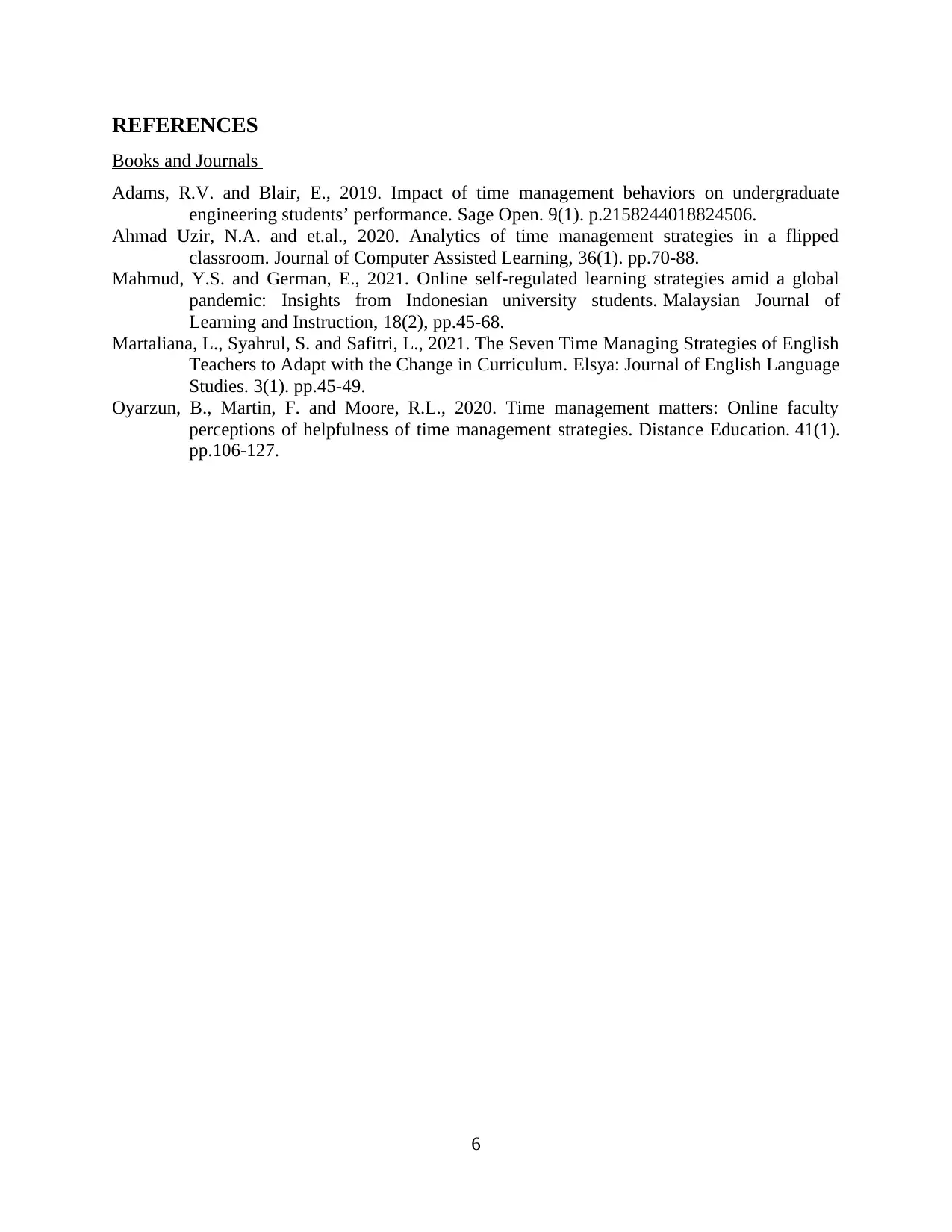
REFERENCES
Books and Journals
Adams, R.V. and Blair, E., 2019. Impact of time management behaviors on undergraduate
engineering students’ performance. Sage Open. 9(1). p.2158244018824506.
Ahmad Uzir, N.A. and et.al., 2020. Analytics of time management strategies in a flipped
classroom. Journal of Computer Assisted Learning, 36(1). pp.70-88.
Mahmud, Y.S. and German, E., 2021. Online self-regulated learning strategies amid a global
pandemic: Insights from Indonesian university students. Malaysian Journal of
Learning and Instruction, 18(2), pp.45-68.
Martaliana, L., Syahrul, S. and Safitri, L., 2021. The Seven Time Managing Strategies of English
Teachers to Adapt with the Change in Curriculum. Elsya: Journal of English Language
Studies. 3(1). pp.45-49.
Oyarzun, B., Martin, F. and Moore, R.L., 2020. Time management matters: Online faculty
perceptions of helpfulness of time management strategies. Distance Education. 41(1).
pp.106-127.
6
Books and Journals
Adams, R.V. and Blair, E., 2019. Impact of time management behaviors on undergraduate
engineering students’ performance. Sage Open. 9(1). p.2158244018824506.
Ahmad Uzir, N.A. and et.al., 2020. Analytics of time management strategies in a flipped
classroom. Journal of Computer Assisted Learning, 36(1). pp.70-88.
Mahmud, Y.S. and German, E., 2021. Online self-regulated learning strategies amid a global
pandemic: Insights from Indonesian university students. Malaysian Journal of
Learning and Instruction, 18(2), pp.45-68.
Martaliana, L., Syahrul, S. and Safitri, L., 2021. The Seven Time Managing Strategies of English
Teachers to Adapt with the Change in Curriculum. Elsya: Journal of English Language
Studies. 3(1). pp.45-49.
Oyarzun, B., Martin, F. and Moore, R.L., 2020. Time management matters: Online faculty
perceptions of helpfulness of time management strategies. Distance Education. 41(1).
pp.106-127.
6
⊘ This is a preview!⊘
Do you want full access?
Subscribe today to unlock all pages.

Trusted by 1+ million students worldwide
1 out of 6
Related Documents
Your All-in-One AI-Powered Toolkit for Academic Success.
+13062052269
info@desklib.com
Available 24*7 on WhatsApp / Email
![[object Object]](/_next/static/media/star-bottom.7253800d.svg)
Unlock your academic potential
Copyright © 2020–2026 A2Z Services. All Rights Reserved. Developed and managed by ZUCOL.




